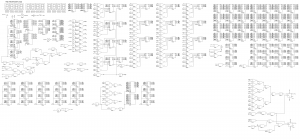Central processing unit

Central processing unit (CPU), or sometimes simply processor, is the component in a digital computer that interprets instructions and processes data contained in software. CPUs provide the fundamental digital computer trait of programmability, and are one of the core components found in almost all modern microcomputers, along with primary storage and input/output facilities.
The processing is done in the arithmetic logic unit (ALU), all other parts of the CPU can be viewed as support circuits that bring the data in and out as fast as possible according to the rules specified in the program.
All modern digital processors are equivalent in the way that they can all solve the same problems and even emulate each other if given the correct program, enough memory and enough time. This is called Turing completeness. The amount of logic required to make a Turing complete processor is surprisingly small, just a handful or two of relays may be enough. The main problem is not logic but making a large and reliable digital memory bank.